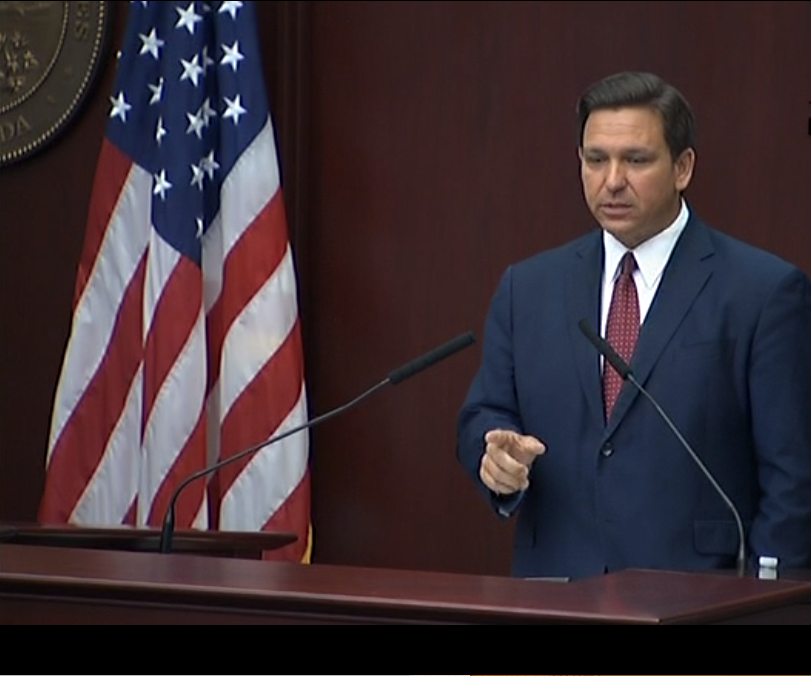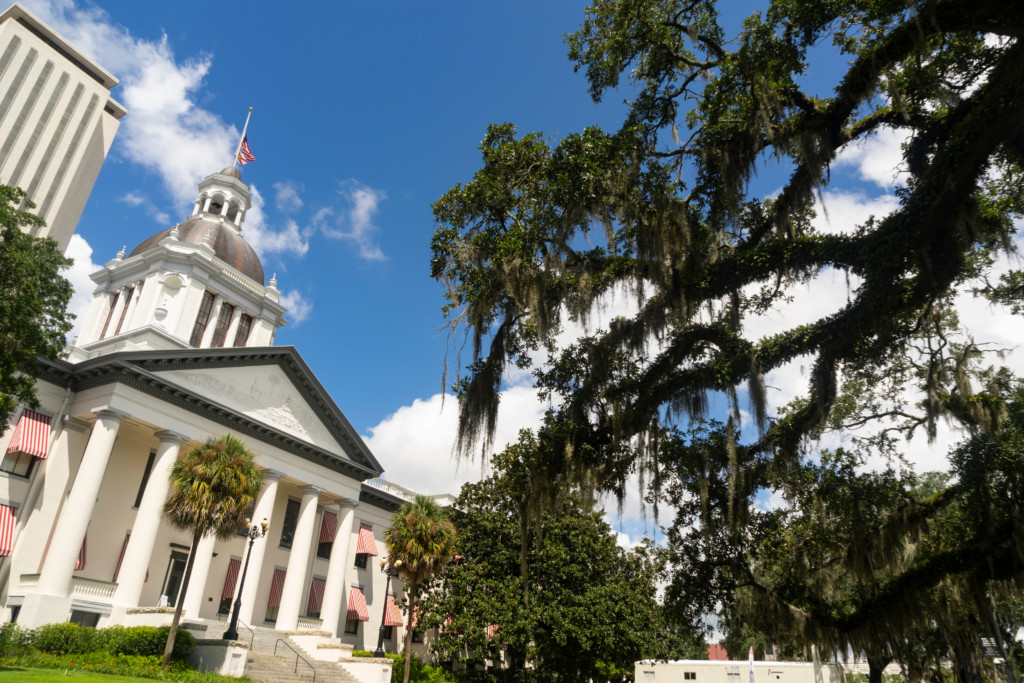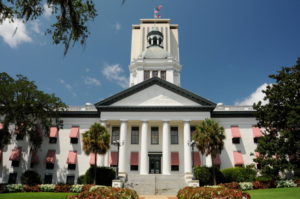The Florida House and Senate unanimously backed bills designed to make sure any student who wants an education choice scholarship for students with unique abilities can get one.
House Bill 1, the landmark legislation passed earlier this year, raised the cap on enrollment in the state's Unique Abilities scholarship program and ensured the number of available scholarships would grow more quickly in future years.
State economists pegged the maximum number of scholarships for the current school year at 40,913.
However, that number does not apply to students who previously enrolled in the phased-out McKay Scholarship program, attended public schools the previous year, were adopted, live in foster care, are children of active-duty military or law enforcement, or received specialized services for students with disabilities through the state's Voluntary Prekindergarten Program.
Those provisions allow tens of thousands more students to receive scholarships.
So far this year, Step Up For Students, which publishes this blog and administers the bulk of scholarships in the state, has awarded more than 85,000 scholarships under the program, an increase of approximately 17,000 from the previous year.
Despite that major growth, demand for scholarships has outstripped supply. Lawmakers, in town this week for a special session, approved legislation to fix that.
HB 3-C would allow scholarship funding organizations, including Step Up, to work with the Department of Education to determine how many more students qualify for scholarships this school year. Students who apply by Dec. 15 will be able to receive a scholarship.
Funding for the increase in scholarships would be absorbed by a $350 million fiscal cushion that lawmakers have already set aside to help manage the growth of scholarship programs under HB 1.
In subsequent years, the number of available scholarships would continue to increase by 3% of the number of students with disabilities in the state, as the current law allows.
The measure is headed to Gov. Ron DeSantis’s desk.
“I know so many families at home whose children are going to benefit by this,” said Rep. Jenna Persons-Mulicka, R-Fort Myers when House approved the bill 111-0 on Tuesday. “They’ve been reaching out, and what can we do and those funds are going to go to great use. As the stepmother of a child with a unique ability, I know firsthand how important every resource is to provide to families.”
 Members of Florida’s Senate education committee today approved a bill that would simplify the approval process for Florida families who are applying for K-12 education choice scholarships. The 6-3 vote along party lines saw all Republicans in favor.
Members of Florida’s Senate education committee today approved a bill that would simplify the approval process for Florida families who are applying for K-12 education choice scholarships. The 6-3 vote along party lines saw all Republicans in favor.
Senate Bill 1348, which the committee amended, would make technical fixes to HB 7045, which the Legislature passed last year. That bill, described as the largest expansion of education choice in the nation, extended scholarship eligibility to more Florida students, including children from military families, and folded the Gardiner Scholarship Program for students with unique abilities into the Family Empowerment Scholarship Program.
In August, the McKay Scholarship program for students with certain special needs also will be merged with the Family Empowerment for Unique Abilities.
SB 1348 addresses challenges that resulted from such a large expansion and smooths the process for families and participating schools. The bill still requires the Florida Department of Education to cross check the list of participating students against public school enrollments. Additionally, it removes a requirement that cross checks be completed before funds are awarded, eliminating a delay in payments to families.
According to a staff analysis, the bill also requires the Department to adjust scholarship payments to school choice scholarship funding organizations; recalculate the state allocation for school districts upon completion of cross checks; and transfer scholarship funds to the scholarship funding organization upon receipt of necessary documentation from the organization to verify the student’s participation.
“Once the cross check is complete, the scholarship funding organization would return the money of any students who showed up at public school instead so (the school district) can be made whole,” explained the bill’s sponsor, state Sen. Manny Diaz Jr., R-Hialeah Gardens.
Diaz said the bill would prevent parents whose children were awarded scholarships from experiencing funding delays.
One of those parents, Brittany Watson of Marianna, was awarded scholarships for her daughter and son for this school year and enrolled them at Playbig Learning Center, where they were thriving. Soon after, she was told that both children were still listed as being registered in their public school district, even though Watson withdrew them months earlier. As a result, she learned, their scholarships would not be funded.
“I spent two frustrating months trying to get this cleared up,” Watson said. “All that time I was terrified of having to pull my kids out of the school that was working for them. Thankfully, Playbig allowed them to stay while hoping the issue would be resolved.”
Watson said she’s grateful for the scholarships and understands the need to cross check school enrollments.
“But families shouldn’t be entangled in red tape that can delay, or deny, their children’s education,” she said. “This bill, as amended, will help the process be more effective and efficient and not cause families and schools unnecessary financial stress. That would be a win-win for everyone."
 While other states were mandating lockdowns during the coronavirus pandemic, Florida was right to keep the state open, including its brick-and-mortar schools, Gov. Ron DeSantis said in his annual state of the state address today.
While other states were mandating lockdowns during the coronavirus pandemic, Florida was right to keep the state open, including its brick-and-mortar schools, Gov. Ron DeSantis said in his annual state of the state address today.
“Florida schools are open, and we are only a handful of states in which every parent has a right to send their child to school in person,” DeSantis told House and Senate members who gathered for the opening of the 176th legislative session. “We will not let anybody close your schools; we will not let anybody close your businesses, and we will not let anybody take your jobs.”
The governor also premiered a video that included scenes of happy, masked schoolchildren walking single file down the hall while being led by a happy, masked teacher. He thanked school administrators for their role in making sure campuses opened for the 2020-21 school year safely and smoothly.
In states that closed campuses, DeSantis said, the consequences will be “catastrophic and long lasting.”
Continuing the subject of education, DeSantis added that he hopes to build on last year’s priorities, which included a $500 million boost to raise district schoolteachers’ starting salaries to $47,500, putting Florida in the nation’s top five for teacher pay. He also cited education choice as a priority and congratulated the state for rising to No. 2 nationally in the percentage of graduating seniors passing Advanced Placement exams.
“Florida is leading in education, and we must continue to do so,” he said.
DeSantis’ remarks followed speeches from top legislative leaders delivered from their respective chambers earlier in the day.
State Senate President Wilton Simpson, R-Trilby, spoke specifically about Senate Bill 48, sponsored by Sen. Manny Diaz Jr., R-Hialeah. The bill would streamline the education choice system by combining five scholarship programs into two. It also would convert traditional scholarships to flexible spending accounts to give parents more control over their children’s education.
Simpson said the pandemic amplified the importance of parents’ ability to choose the best learning environment for their children. The scholarship programs, a patchwork system developed over two decades, needs to be simplified and accessible for the more 100,000 families who benefit from the program, which provides equity to lower-income families, he said.
“The fact is, school choice has always existed for wealthy families,” Simpson said. “I believe this option should be available to every family. It is the only way to truly break the cycle of generational poverty.”
You can read more about SB 48 here.
The 2021 legislative session is scheduled to run for 60 days and is expected to take up a number of education issues besides SB 48. These include school funding, dual enrollment affordability for private and homeschool families, career planning and workforce development and early childhood education.
Legislation under consideration includes SB 52, which would allocate $12.5 million to cover the costs of private and homeschooled who participate in dual enrollment programs by taking courses from a partnering college or university. The bill also would allocate $16 million to cover the costs of dual enrollment courses taken during the summer for all Florida students, including those who attend public schools.
The bill and its House companion, HB 281, would fix a glitch that occurred in 2013, when a change in the law shifted the cost of dual enrollment programs from colleges to school districts. Because school districts are state funded, the state picked up the cost. But private schools, which were not allowed pass the cost on to their students, had no alternative but to limit their dual enrollment offerings.
The Florida Conference of Catholic Bishops and the Florida Association of Academic Nonpublic Schools have each endorsed the dual enrollment bills.
 In remarks at the start of the 2021 legislative session earlier today, Senate President Wilton Simpson, R-Trilby, stressed the crucial role of school choice programs and the right of every family to make appropriate educational decisions for their children, regardless of their income level.
In remarks at the start of the 2021 legislative session earlier today, Senate President Wilton Simpson, R-Trilby, stressed the crucial role of school choice programs and the right of every family to make appropriate educational decisions for their children, regardless of their income level.
Here are Simpson’s remarks:
Most parents across our state are dedicated and hardworking and would do anything to give their children a better life then they had.
That’s why over the last two decades Floridians have embraced school choice programs. The problem is right now we have a pretty confusing system with various eligibility and funding mechanisms. The ongoing pandemic has even further highlighted the important responsibility of every parent to choose the best learning environment for their child.
With well over 100,000 students currently using the variety of scholarship programs we have available, it’s about time we streamlined eligibility and funding so that parents have a clear idea of their options.
The fact is, school choice has always existed for wealthy families. I believe this option should be available to every family. It is the only way to truly break the cycle of generational poverty. I’m pleased to see Senator Diaz leading this effort.
 The 175-year-old Florida Legislature, which turns 176 on May 26, reconvenes today for its annual 60-day legislative session. The largest global pandemic since 1918 has played havoc with the state’s budget, so money, as usual, will be the dominant issue.
The 175-year-old Florida Legislature, which turns 176 on May 26, reconvenes today for its annual 60-day legislative session. The largest global pandemic since 1918 has played havoc with the state’s budget, so money, as usual, will be the dominant issue.
About 85,000 school district students were no-shows this year. The state held school districts harmless and paid them to educate these missing students, but whether taxpayers can afford continuing to do so will be a contentious issue. If the bulk of these students do not return this fall and state government stops funding nonattending students, school districts will be scrambling to reorganize their staffing models, building utilization plans, and budgets.
The federal government is sending billions in education funding to the states via a succession of Covid-19 stimulus bills, but these are one-time payments that should not be used for ongoing expenses, such as employee salaries and benefits. House Speaker Chris Sprowls recently sent a letter to district superintendents warning them against spending non-reoccurring funds on reoccurring expenses.
If the federal government passes another stimulus bill, state government and school districts may find themselves with millions of federal dollars that cannot be spent on pressing needs because the federal money is non-reoccurring. How best to manage this mix of one-time payments with ongoing financial needs will be another contentious issue for legislators to resolve.
The primary education choice bill this session is Senate Bill 48, sponsored by Sen. Manny Diaz Jr., and a priority of Senate President Wilton Simpson. This bill consolidates five education choice programs into two, provides families with greater spending flexibility by turning all the scholarships into Education Savings Accounts (ESAs), stabilizes the programs’ funding, creates growth caps to control expenses, and cleans up a plethora of technical issues that were making the programs overly cumbersome for families and schools.
You can read more about SB 48 here.
Senate staff spent six months working on various aspects of this bill, and it shows. Some of the more nuanced technical solutions are elegant despite the complex legislative language in which they are embedded.
That SB 48 is a Senate bill is unusual. Traditionally, innovative education choice legislation originates in the Florida House and then must navigate its way through the Senate. For the Senate to step up and propose a landmark education choice bill is a pleasant surprise. Once the House’s improvements are included, this will be a historic bill with significant implications for the education choice movement nationally.
The other important education choice bill this session makes dual enrollment programs more accessible to non-school district students. (See here and here.) Legislative changes a few years ago made dual enrollment far less accessible for private school students. Consequently, private school student participation in dual enrollment has been declining. This bill will hopefully fix that problem.
The House has made career planning and workforce development a top priority this session. The pandemic has driven unemployment rates to historic highs and forced millions of people to change jobs and careers. Aligning Florida’s education and training programs with current and future job openings is a critical need the Legislature will be addressing this session. Kudos to the House for taking the lead on this, and to the House staff for working endless hours crafting this legislation.
The House is also promoting legislation that will deliver developmentally appropriate books to the homes of young readers. This program, in concert with the existing Reading ESA for struggling elementary school readers, should help improve many students’ reading skills and, hopefully, inspire a love of life-long reading.
We have all been impacted by this devastating pandemic, but Floridians are resilient, optimistic, and forward looking. We are already on the road to recovery – a recovery I am confident will be accelerated by the decisions our Florida Legislature and governor make over the next 60 days.

TALLAHASSEE -- The Senate Education Committee is expected to consider a measure today that would make it easier for economically disadvantaged families to access a new K-12 scholarship program approved last year.
Committee chairman Manny Diaz, R-Hialeah, is proposing an amendment to SB 1220, a bill that currently spells out rules for teacher training and qualifications. The amendment would add provisions aimed at aligning application and eligibility guidelines between the new Family Empowerment Scholarship, adopted last year and serving 18,000 students, and the Florida Tax Credit Scholarship, created in 2001 and serving 108,000 students.
Both scholarship programs serve students from lower-income and working-class families. The primary difference is that the Florida Tax Credit Scholarship is funded by corporations that receive a 100 percent tax credit, and the Family Empowerment program is funded directly from the state education budget.
The two programs now use slightly different rules to determine eligibility, such as household income levels. Diaz’ amendment represents an effort to make them more alike, therefore streamlining the process for families who apply. Among the proposed changes:
In addition to the scholarship amendment, the committee also is expected to consider SB1246, which would make it easier for students who attend private schools or are home schooled to participate in dual enrollment programs at participating colleges and universities. The bill is sponsored by Sen. Kelli Stargel, R-Lakeland.
The Senate Education Committee meets at 2:30 p.m. at 415 Knott Building.

SB 7070 creating a new Family Empowerment Scholarship was heard on the floor of the Senate Thursday.
In a party-line vote, the Florida Senate on Thursday passed a bill that would create the state-funded Family Empowerment Scholarship, which would eliminate the waiting list for low-income families seeking the Florida Tax Credit Scholarship (FTC) and expand school choice opportunities for thousands of others.
The legislation, SB 7070, would serve 18,000 students in the program’s first year. The number may expand each year by a quarter of one percent of the state’s total public school enrollment. A similar bill pending in the House, HB 7075, would accommodate 28,000 students in the first year. There are about 13,000 students on the FTC waiting list. Unlike the FTC, the Family Empowerment Scholarship (FES) would be funded with tax revenues from the Florida Education Finance Program.
Sen. Manny Diaz (R-Hialeah), who sponsored the bill and chairs the Education Committee, characterized Thursday’s 23-17 vote as “monumental.”
“Public education was started to prepare the populace to uphold our republic,” Diaz said. “It wasn’t about institutions or unions, but (educating) the individual, who could continue to protect the freedoms we all live under today.
“When we talk about public education, we need to talk about the individual student, not the collective. If one student is not receiving the education they need to uphold the republic, we have not done our job.”
Sen. Kelli Stargel (R-Lakeland), who voted for the measure, said the bill “strikes the perfect balance between parents and the system.”
“For years, we worked on bills to give parents options,” Stargel said. “This bill gives the ultimate choice to for parents to have the same choices as every other parent.”
In a statement afterward, John Kirtley, chairman of Step Up For Students, a nonprofit organization that administers the Florida Tax Credit Scholarship (and which hosts this blog), echoed Diaz’s words.
“This is a monumental achievement by the Florida Senate,” Kirtley said. “I want to thank Senate President Bill Galvano, K-12 Chair Manny Diaz, and K-12 Appropriations Chair Kelly Stargel for their incredible leadership in getting this bill through their chamber. It will give thousands of low-income and working-class parents the power to choose the best learning environment for their children.”
The FTC program serves more than 100,000 students statewide with an average annual family income of $25,751. But this year, for the first time in 14 years, a slowing rate of growth in fundraising resulted in fewer students served than the prior year.
Demand for the scholarship remains strong. More than 150,000 students have started applications for the 2019-20 school year, more than 59,000 of whom are new, and nearly 95,000 scholarships already have been awarded.
That mismatch spurred Gov. Ron DeSantis and House and Senate leaders to seek a solution to accommodate Florida families looking for more education options.
Under the Senate bill, the income eligibility limit for families to receive the scholarship would be 300 percent of the federal poverty level ($77,250 for a family of four), up from the 260 percent limit in the FTC program. The House version also sets the first-year income limit at 300 percent, but increases it to 325 percent the next year and every year thereafter to 375 percent in 2022-23. Both bills give priority to those families with household incomes up to 185 percent of the poverty limit ($47,637 for a family of four).
Several lawmakers argued that the bill is unconstitutional because it would allow public dollars to be spent at private, religious schools, and that the FES would divert money from public schools.
Diaz said the opposite is true.
“If this gets signed, we’re taking away the obstacle for 129,000 students to reach the best educational opportunity, according to their parent,” he said. “Every parent knows what’s best for their individual child. At no point should that responsibility go to the government.
“Public schools aren’t going to go away. There’s no drain on the money, there’s actually a savings. This bill provides flexibility for our public schools.”
During a lengthy exchange with Sen. Perry Thurston (D-Fort Lauderdale), Diaz said funding the tax credit scholarship through the FEFP was not a new process, noting that the McKay Scholarship for students with special needs has been funded the same way for 19 years.
Thurston asked if students on the tax credit scholarship have a “recognized special need.”
Diaz responded: “The special needs these children have is that their parents can’t afford to make choices to have their children in the best educational environment.”
Diaz later added: “It’s paramount that our students have the right opportunities, regardless of their ZIP code, to have the best education possible.”
Thurston was not swayed.
“We’re still draining money and providing every opportunity for additional public school funds to” be spent at public schools, Thurston said during debate. “It’s a continuing nail in the coffin to our public education system.”
In response to those concerns, Sen. Keith Perry (R-Gainesville) argued that because it costs less to educate scholarship and charter school students, choice programs actually save money for traditional public education.
“This is pretty simple math,” Perry said. “We’ve got over $1.4 billion that we save, or we spend less on. If all those students were put into regular public schools, not only would we have $1.4 billion more we’d have to come up with, we’d have to add classrooms at a $1.5 billion investment. You can’t say that we’re diverting money. We’re saving money.”
Sen. Bill Montford (D-Tallahassee) questioned the wisdom of allowing parents to remove their children from a highly rated public school system with high accountability and academic standards.
“For 20 years or longer, we’ve worked on and modified an accountability system for public schools that has been classified as one of the best in the nation,” Montford said. “Why are we allowing to take public funds to go to school where standards are not as high or maybe there aren’t any standards? If our public schools are so good, why allow parents that choice? Do we not want every student in the state to be held to at least a minimum standard?”
In his closing remarks before the vote, Diaz listed the number of state-funded programs – the McKay Scholarship, Voluntary Pre-Kindergarten, Bright Futures, and others – that allow Floridians to spend public dollars at the private, religious school of their choice.
“No one in this chamber opposes any of our investment in those students at that level,” he said. “It is only when we reach the K-12 level that someone has a problem with making an investment on a student on behalf of a parent to educate a child.”
As the 2019 legislative session winds to a close, the Senate Appropriations Committee on Thursday advanced a bill that would create a new state-funded program to eliminate a waiting list for the Florida Tax Credit Scholarship for lower-income families.
The committee approved a significant “strike-all” amendment for SB 7070 proposed by the bill’s sponsor, Education Committee Chair Manny Diaz (R-Miami). The changes include increasing the income eligibility limit for families, putting the bill in line with income limits in a similar bill, HB 7075, being considered by the House.
Earlier in the week, the House Education Committee convened for the last time for this legislative session, dealing with two bills connected to education choice:
Additionally, HB 7123, which would require school districts that have had successful voter referendums to share their additional funding with charter schools, passed its final committee in the House. An amendment added in the House Appropriations committee would require charter schools that receive a portion of these funds to use them for the intended purpose of the referendums.

SB 7070 establishing the Family Empowerment Scholarship has cleared all its committee hurdles and is headed to the Senate floor.
The Senate Appropriations Committee on Thursday advanced a bill that would create a new state-funded program to eliminate a waiting list of 13,000 for the Florida Tax Credit Scholarship for lower-income families.
SB 7070, which would establish the Family Empowerment Scholarship, previously passed two other committees. But the Appropriations Committee approved a significant “strike-all” amendment by the bill’s sponsor, Education Committee Chair Manny Diaz (R-Miami).
The changes include increasing the income eligibility limit for families to 300 percent of the federal poverty level ($77,250 for a family of four), up from the previous version’s 260 percent, while giving priority to those families with household incomes up to 185 percent of the poverty limit ($47,637 for a family of four). That puts the Senate bill in line with the income limits in a similar bill, HB 7075, being considered by the House.
The Senate bill also raises the cap on the number of students served to 18,000 in the program’s first year, up from 15,000. The number would expand each year by 1 percent of the state’s total public school enrollment. The House bill would accommodate 28,000 students in the first year.
Diaz told committee members Thursday that the bill prioritizes the lowest-income, neediest families.
“I will stand up here and defend that all night long,” Diaz said. “At the end of the day, these students deserve the same chances as every student who goes to a great public school, or whose parents can afford to put them in a private school.”
Sen. Bill Montford (D-Tallahassee) praised the bill as “a historic piece of legislation” but voted against it, saying he couldn’t reconcile using money from the Florida Education Finance Program (FEFP) to fund the measure.
“I know we did it with the McKay (Scholarship for students with special needs), and it worked extremely well,” Montford said. “But this is a huge leap. If there’s a way to work with you on that one piece, I’d like to.”
In response to a question from Sen. Perry Thurston (D-Fort Lauderdale), who voted against the bill, Diaz said the measure “takes no money from the FEFP,” saying that students on the scholarship are educated at 95 percent of district average.
“The district keeps 5 percent for each student they’re not educating,” Diaz said.
Several people spoke in favor of the bill. Among them was Carletha McGuire, who worked more than 20 years with special needs students as a paraprofessional in Miami-Dade public schools. McGuire is raising two grandchildren and a nephew, each of whom have been on the scholarship.
She said her nephew Corey used the tax credit scholarship to attend Kids Learning Center for two years, which boosted him academically so he could qualify for the magnet program at Coral Reef High School in Miami. He is taking dual enrollment classes and is expected to graduate this year with an associate’s degree. Her older granddaughter, Martina, graduated from Grace Christian Preparatory and now attends Bethune-Cookman University on a partial academic scholarship.
Her younger granddaughter, Monique, started at Kids Learning Center on the scholarship but was on the waiting list this year. McGuire had to transfer her to a public school for fifth grade, and her grades have slipped.
“She tells me every morning, ‘I just want to go back to Kids Learning Center’,” McGuire said. “So I am asking you: Let all our kids off the waiting list by creating the Family Empowerment Scholarship. There are so many who are being left behind. Let’s help these kids get what they need so their parents and grandparents don’t have to worry.”
Nicolette Springer, legislative advocate with League of Women Voters of Florida, was among the bill’s opponents. She called the legislation unconstitutional because it would allow public dollars from the FEFP to be spent at private schools
“My heart goes out to the children here today,” Springer said, referring to scholarship recipients and those on the waiting list. “Opportunities would be in their neighborhoods if public dollars had not been stripped.”
In response to a question from Sen. David Simmons (R-Longwood), Springer said the League of Women Voters would not support any bill that takes public money from public schools.
Later, in response to those arguments, Diaz said: “When this discussion comes up, there’s always an argument about do we spend enough money, money being diverted [from public schools]. I always ask this question: What is the right amount? When is enough enough?”
He noted the maximum number of students who would receive a Family Empowerment Scholarship would 129,000, out of 2.8 million public school students statewide.
“Public education is about the education of the children, and not about the institutions,” Diaz said.
The Florida Tax Credit Scholarship serves more than 100,000 students statewide with an average annual family income of $25,751. But this year, for the first time in 14 years, a slowing rate of growth in fundraising resulted in fewer students served than the prior year.
Demand for the scholarship remains strong. More than 148,000 students have started applications for the 2019-20 school year, and more than 90,000 scholarships have been awarded. About 55,000 are new applicants, up 45 percent from this time last year.
A bill that would allow teachers and students to focus on mastery of grade-level skills rather than grades cleared the House Education Committee Tuesday.
The bill, HB 401, would expand an existing “competency-based” pilot program to any school district that wants to participate. The program allows students to earn credits based on mastery of content and skills regardless of how much time they spend in the classroom.
The bill’s sponsor, Rep. Nick DiCeglie (R-Indian Rocks Beach), said it will allow educators to “meet students’ unique, strengths, interests and needs, while allowing students to play a greater role in their learning.”
“This mastery-based principle is fairly new, but it’s been successful in districts that have implemented it,” DiCeglie said. “It is innovative and thinking outside the box. Students in the state deserve that.”
Pinellas, Palm Beach and Seminole County school districts, as well as the University of Florida’s P.K. Yonge Development Research School, have been participating in competency-based learning since 2016, when the Florida Legislature permitted them to apply to the Florida Department of Education for waivers from state testing regulations.
The bill would allow participating schools to develop an alternative grading system in grades 6 through 12 if they continue to utilize a 4-point scale to determine grade point averages for college and scholarship applications.
The Senate Education Committee passed a similar measure, SB 226, last week.